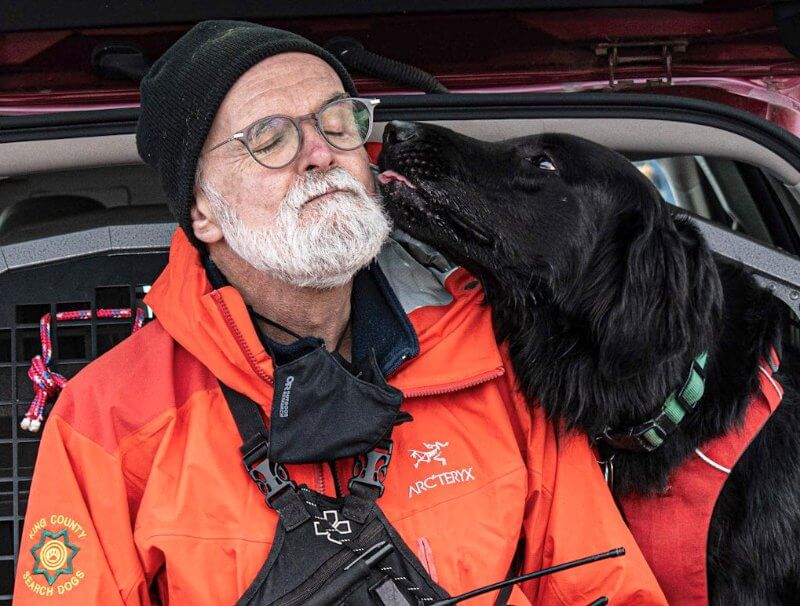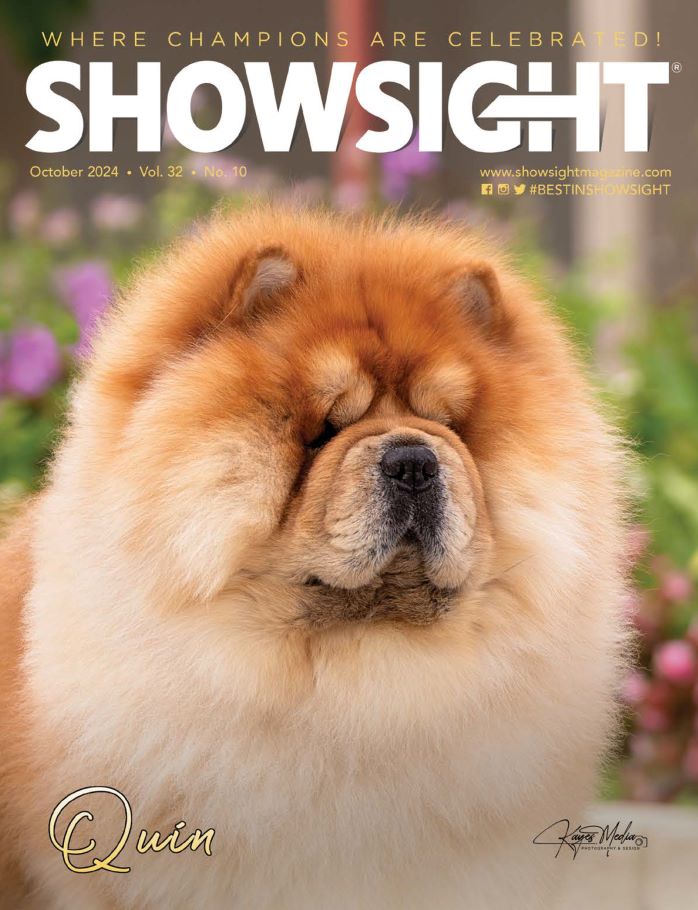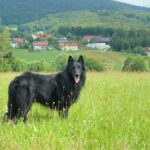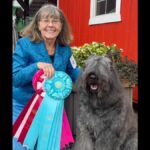Interview with Jonathan Izant
How did you and Lincoln get your start in Search and Rescue? At King County Search Dogs?
Jonathan Izant: I joined King County Search Dogs (KCSD) in 2015 training Emmett, another wonderful Flat-Coated Retriever, and started training Lincoln in 2017. KCSD is fortunate to have several outstanding senior dog handlers. Two of them have over 45 years of experience in law enforcement and Search and Rescue each, and both have written foundation Search Dog text books. In addition to having this wealth of expertise at weekly trainings, Lincoln and I have participated in a number of regional Search Dog workshops.
I started doing volunteer search and rescue work in 1979 with a backcountry Nordic unit of the National Ski Patrol in Colorado and got my first Flatcoat in 1988. Working with Lincoln in KCSD has allowed me to combine two passions: Performance Dog activities and community service.
Lincoln has local and national certification in two types of Search Dog work:
- Air Scent, where he works off-lead to find any human lost in a wilderness or rural setting,
- Human Remains Detection, where he finds buried, surface or hidden bone or tissue both outdoors and in buildings.
The KCSD Air Scent certification test requires a dog-handler team to find two people “lost” in 40 acres of dense Pacific Northwest forest in two hours. Lincoln recently completed his biannual re-certification in 25 minutes!
Is a Flat-Coated Retriever especially well-suited for Search & Rescue work?
Jonathan Izant: “That dog doesn’t look like it is working. It’s having too much fun!” —Anonymous Belgian Malinois Handler Overheard at Search Dog Training
Lincoln is a classic Flatcoat; energetic, focused, alert, playful, social, biddable, independent, and a bit stubborn. Lincoln LOVES to search! His gundog roots provided him with a great nose and natural skills in locating specific scents. Flatcoats are athletes, and according to his GPS collar, Lincoln has covered over 26 miles in a day searching in the Alpine Lakes Wilderness (much further than his handler).
Flatcoat stubbornness is actually an asset in challenging scent environments. Lincoln is persistent and will continue to work in and out and around faint scents until he finds the source. His steady, albeit energetic, Flatcoat temperament helps him deal with distractions, challenging rocky environments, boats, and helicopter flights.
Always the larrikin, Lincoln loves to get in a few slobbery kisses when he finds a subject before racing back to announce his find. There are almost a dozen Flatcoats doing Search and Rescue work in Oregon, Washington, and other parts of the US and Canada, many of which have distinguished themselves in Air Scent, Trailing, and Human Remains work.
Flatcoat stubbornness is actually an asset in challenging scent environments. Lincoln is persistent and will continue to work in and out and around faint scents until he finds the source.
What are some of the specific areas in which you and Lincoln have been deployed?
Jonathan Izant: King County is twice the size of the State of Rhode Island and stretches from Puget Sound to the ridge of the Cascade Mountains. We participate in searches in surrounding counties as well, so Lincoln has deployed in everything from saltwater beaches to residential neighborhoods, to parks and golf courses, to dense forest, to alpine meadows, to arid grassland and tumbleweed.
Lincoln’s HRD work includes working from shore and from boats on fast-moving rivers and swampy marshes as well as forests and roadsides. Our search assignments are often miles from accessible trailheads, so Lincoln also has experience riding in all-terrain vehicles and being lowered from and hoisted up into helicopters.
Can you share a particularly memorable Search and Rescue story?
Jonathan Izant: In April 2021, King County Search Dogs was called out by King County Sheriff and Bellevue Police at 1:00 AM. An elderly subject with dementia and no English skills had walked away from their family’s suburban Bellevue home earlier in the day. Lincoln and all of our search gear were loaded into the car and we left our house at about 1:30 AM. Approximately 40 King County Search and Rescue volunteers and three KCSD dog teams responded. Ground searchers fanned out, searching areas where the subject was known to wander.
Lincoln and I were asked to do a circuit of the neighborhood and we started at about 2:15 AM. Normally I would work Lincoln on a 20-foot lead in a residential neighborhood to keep him safe from car traffic, but this is not as effective as having Lincoln range on his own. Since I had two experienced support searchers with us and Lincoln was wearing his LED search vest, I worked him off-lead since there was no traffic at that time of night.
Lincoln searched energetically (as always) looking around the neighborhood, and after about 15 minutes he ran down behind a house and excitedly came back up onto the road. When it is dark, all searchers with headlamps look pretty much the same, and so, Lincoln first tried to indicate on one of my supports. When Lincoln realized it was not the right person, he ran over to me and tugged on his indicator ball hanging from my belt and then ran back down behind the house. We went down and confirmed that the subject was in the far corner of the backyard. We radioed for the police and family (since the subject had no English skills) who quickly arrived.
The subject was scared, cold, and disoriented but in good shape. Lincoln and I have been part of several successful late-night searches, but once the dust had settled and I was driving home it really struck me that the amazing little puppy in the back of the car had made his first live find.
There is a special amazement when you realize your dog has just helped save a life. It must be noted, however, that while Search Dogs get headlines, the real story is all the teamwork that goes into Search Dog work. Starting with an experienced breeder and a family who supports and tolerates the time and expense of volunteer work, it includes the teammates who have hidden in cold, wet forests and used their decades of experience to train new recruits like Lincoln and me.
It includes the many other parts of King County Search and Rescue Association; the ground searchers, ATV, 4×4, and operations units, as well as the Sheriff’s Deputies who all come together to help our neighbors in need. None of it would be possible without our local community that provides financial support for some of our equipment needs.
There is a special amazement when you realize your dog has just helped save a life. It must be noted, however, that while Search Dogs get headlines, the real story is all the teamwork that goes into Search Dog work.
How has training and working alongside Lincoln made an impact on your life in general?
Jonathan Izant: Training and equipping Lincoln has become a large part of our family lifestyle and budget, as is the case for many dog-related activities. Being on-call for search missions 24/7/365 adds another layer of planning and preparedness as well as the need for flexibility and patience from friends and family. Having a chance to watch Lincoln’s enthusiasm when searching through fern-covered forests, and especially partnering with him to save lives, makes it all worthwhile.









